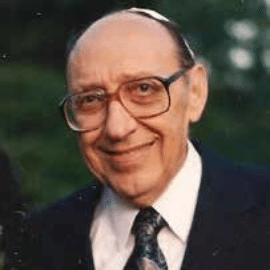Rabbi Sam Scolnic, z”l

Rabbi Sam Scolnic, z”l
Rabbi Sam Scolnic, who died May 26, 2012, at age 88, arrived at Beth El when he was 33 years old and remained this congregation’s rabbi for the next 32 years. Under his tenure, Beth El’s membership skyrocketed from 145 families in 1956 to more than 850 by the time he retired in 1988. He instituted many of the major programs that still exist at Beth El today: the preschool, egalitarian worship, daily morning and evening minyans, the Early Shabbat Morning Minyan, and the Saul Bendit Institute (which was renamed the Rabbi Samuel Scolnic Adult Institute in his honor in 2013).
Putting Beth El on the Map
“Sam Scolnic put this congregation on the map,” said Rabbi Bill Rudolph in his eulogy at Rabbi Scolnic’s funeral. “He gave it its basic shape and created its culture—democratic (with a small d), egalitarian (ahead of its time), heimische, unpretentious, willing to experiment, and serious about education. In essence, when you think about those characteristics, that is pretty much what Beth El is today.”
A Texas native, Rabbi Scolnic was ordained at the Jewish Theological Seminary in New York and returned to Tyler, Texas, for his first pulpit. He was a chaplain in Korea during the Korean War and served at two Houston congregations before arriving at Beth El in August 1956.
Challenges Ahead
A “hands-on rabbi,” as Rabbi Rudolph described him, Rabbi Scolnic was indefatigable in his efforts to build Beth El. That early work often consisted of walking around Bethesda neighborhoods with the Beth El president, knocking on doors of families they thought were Jewish, convincing them to join Beth El.
One year, the synagogue added 108 new families. “In fact, one of the few crises in the life of the shul in his tenure was whether to cap membership or not, because he was too successful,” said Rabbi Rudolph.
Rabbi Scolnic also assiduously took care of any void in the synagogue’s spiritual life. “When he saw the need for a daily minyan, he didn’t assign the task to someone and hope it happened,” said Rabbi Rudolph. “He showed up every morning for several years till it could stand on its own feet.”
Liberal Conservative
Rabbi Scolnic took to heart his first conversation with Board members when he first arrived at Beth El. They told him they wanted Beth El to be a “liberal Conservative congregation.” He agreed. “That fitted in with my own philosophy,” he said.
A prime example of that liberalism occurred in the late 1960s when a congregant who had lost her father came every day to say Kaddish. “There were evenings when we were short one or two for a minyan, but we couldn’t count her,” recalled Rabbi Scolnic. “I became very upset. I said, ‘It’s time to change that.’”
It was 1968, and the feminist movement was “in the air,” he said. “It wasn’t as if this suddenly came as an illumination to us. But this was a particular situation that affected us, where this woman was coming to say Kaddish regularly, and we could only count her as one of the chairs and not as a person.”
“We decided we would take a whole year for an educational campaign before we called for a vote,” Rabbi Scolnic said. In April 1969, the proposal passed overwhelmingly. The next step was to allow women to be given Torah honors. Again, there was an extended discussion period before the measure was brought to a vote.
His ground-breaking views also affected the larger Jewish community. Rabbi Jan Kaufman, now director of special projects for the Rabbinical Assembly in New York, described in a condolence letter to Judy Scolnic how Rabbi Scolnic supported her before the Washington Board of Rabbis in the early 1980s, a time when women rabbis were just coming on the scene.
She had bet din duty for the Washington Board of Rabbis. “Sam was in charge of the mikveh that day,” she wrote. “He called me…and made it clear that I was to show up for the bet din and if any colleague did not want to use me as a witness because I was a woman – it was too bad. He said he would not make any other arrangements for those colleagues.”
He “conducted his rabbinate with integrity, menschlichkeit, care, and caring,” said Rabbi Rudolph, “We stand on his tall shoulders today, as we have since he hung up his hat 24 years ago and as we will for many years to come.”
Rabbi Scolnic is survived by his wife Judy, their four children, 13 grandchildren, and two great-grandchildren.
Adapted from “Remembering Sam Scolnic: 1923-2012” by Janet Meyers, in the July/August 2012 Scroll.